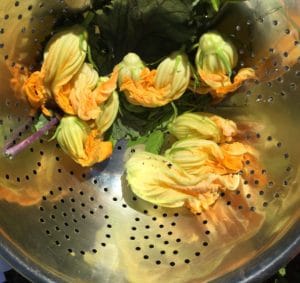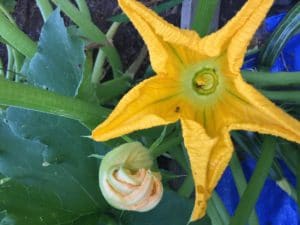Hello Fellow Readers,
I am a new owner of a big girl camera—a digital Nikon SLR. Previously I’ve relied on a point-and-shoot camera, “which is getting long in the tooth,” per my dear Curt. Funny saying, long in the tooth stems from how horses’ teeth continue to grow, indicating their age.
My friend Jim Rimi from Washington, NJ, kindly guided me on what to buy. He’s an accomplished photographer, and he and his wife are talented potters using nature and plants as inspiration in their art. While visiting, I admired their vegetable garden. Jim said they made fried zucchini blossoms and posted a photo on Instagram, which was a big hit.
“Did you save enough flowers so you’ll have zucchini,” I asked. Then I reminisced about the time a woman pulled over while I was on a road walk with Miss Ellie to ask why her zucchini had not borne fruit.
“There are many flowers, which are delicious, but no baby zucchini yet.” Eating the flowers is most likely why you don’t have zucchini, I didn’t say (not wanting to offend), which brings me to the birds and the bees of zucchini.
Many vegetables such as peas, peppers, and tomatoes have self-pollinating flowers. Each flower contains both male and female parts and can readily pollinate in a gentle breeze. They are known as Perfect Flowers with anthers (the male part that contains pollen) and carpals (the structure that holds the female part) in the same flower.
As with cucumbers and other squashes, zucchini have separate male and female flowers on the same plant. Flowers attached to what looks like a little squash are the females. They usually grow close to the center of the plant, sitting low on short stalks. The males are showier and grow on long stems throughout the plant. They appear a week or two before the females and are more plentiful but are short-lived, opening before dawn and closing by mid-morning. It’s critical to not water overhead early in the morning so they have a chance to pollinate. And so, rainy seasons like ours could be a factor in the lack of squash.
Another variable could be not enough sunlight causing less fruit set. Zucchini needs six to eight hours of full sun to be prolific. And, temps over eighty-five degrees during flowering also lessens fruit set.
Back to the delicacy of zucchini flowers: You can eat them raw in salads, cooked in soup, or fried after lightly dipping them in egg, then flour with salt and pepper. In Italy, they are often used in fritters or stuffed with ricotta cheese. Mexican cuisine includes them as a filling in quesadillas.
Some say only harvest male flowers, leaving some to assure you’ll have squash. The thing is, with the decline in pollinators, lessening the population of boys reduces the odds for squash. However, you can help the process along. Pick a male flower, remove the petals to expose the anthers, and rub the pollen directly inside the female flower. Or use a paintbrush or Q-tip. If successful, you’ll see baby zucchini begin to enlarge in a day or two: Tada – family planning for produce. But don’t look a gift horse in the mouth. Garden Dilemmas? AskMaryStone@gmail.com and your favorite Podcast App
I invite you to enjoy the fruits of Rimi Studios’ Art– https://www.rimistudios.com/.
Thank you, Karen & Jim, for your contribution to this story. And, for helping me find a “Big Girl” camera :^)
Column updated 7/31/22




